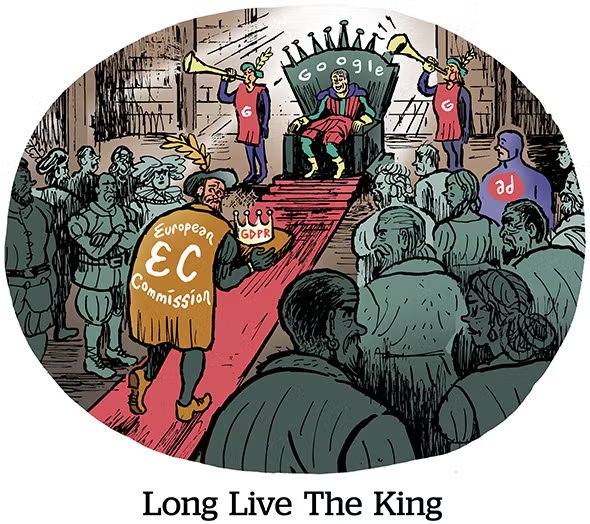How OneTrust Won Trust
The privacy and compliance startup OneTrust is exploring a sale or IPO, The Information reports.
The company is in an awkward growth phase. It’s a 9-year-old startup and brought in half a billion dollars from July 2024 to July 2025. Wow!
But its growth rate is slowing, and there’s less urgency from businesses that have implemented new GDPR and privacy practices.
Also, an unnoted factor in The Information’s report is that OneTrust rocketed out to such early growth thanks in large part to being the recommended privacy partner by Google sell-side account execs.
OneTrust has far greater adoption than any other consent management platform (the tech for collecting and managing consent data on behalf of publishers, primarily for GDPR purposes). Why?
“Google carries the weight in the ecosystem,” InMobi Chief Business Officer Kunal Nagpal told AdExchanger in 2023, after acquiring the No. 2 CMP, which had been Quantcast’s.
The interesting position for OneTrust here is that an obvious growth opportunity is (drumroll, please) advertising revenue.
Except, the reason OneTrust has been the preferred vendor for Google is that it’s the CMP that keeps its hands out of the ad revenue cookie jar, so to speak.
Settling Down
After yet another years-long legal battle, Google has been forced to make small changes to certain sell-side ad tech policies.
In addition to a nearly $3.4 billion (€ billion) settlement, Google has agreed to “tweak” its ad tech products to settle an order with the EU, Bloomberg reports. Publishers can set different price floors for certain bidders, for instance, and Google will allow more interoperability with non-Google demand. If these concessions seem familiar, it’s because they are also remedies being proposed in the DOJ v. Google antitrust case.
Despite having avoided a divestiture requirement, Google sees the EU’s decision as “a step too far,” according to Bloomberg.
Although, policies like Google’s unified pricing rules, which prohibited publishers from setting bidding minimums that varied by SSP, were always self-serving. So pubs don’t see that as a painful concession on Google’s part.
And these changes may be reversed yet. Google still plans to appeal.
The Crony Express
The Department of Homeland Security (DHS) spent more than ever on advertising this year. And a major beneficiary of the department’s new $220 million ad campaign is a Republican consulting firm with ties to DHS Secretary Kristi Noem, ProPublica reports.
The firm, called the Strategy Group, oversaw a recent ad shoot starring Noem at Mount Rushmore. The group worked with Noem during her 2022 reelection campaign for the North Dakota governorship, and CEO Ben Yoho is married to Noem’s chief DHS spokesperson, Tricia McLaughlin.
The Strategy Group isn’t listed in public accounting for the DHS contract, though. Instead, records show $77 million awarded to Republican ad agency People Who Think and $143 million to a Delaware-based LLC that was created days before it won the contract.
According to McLaughlin, DHS doesn’t “have visibility” into how the Strategy Group was subcontracted to oversee the campaign shoot.
But Noem was previously accused of preferencing the Strategy Group in the bidding process for another Noem-starring, state-funded ad campaign in 2023.
This time around, DHS used the Trump administration’s declaration of a national emergency at the border to bypass the usual contract oversight process.
But Wait! There’s More!
CloudX CEO Jim Payne on the AI opportunity in mobile. [Tipsheet.ai]
Google must pay $666 million in damages to two German price-comparison websites for search market abuses. [Bloomberg]
Making on-site vertical video work for publishers. [AdMonsters]
Forbes rolls out a new dynamic AI paywall to target readers with personally tailored subscription offers. [Digiday]
In case you’re worried, WBD CEO David Zaslav will get to keep his stock options when the company is sold. Phew! [Variety]











